现代大学英语第一册教案unit1
- 格式:doc
- 大小:69.00 KB
- 文档页数:5
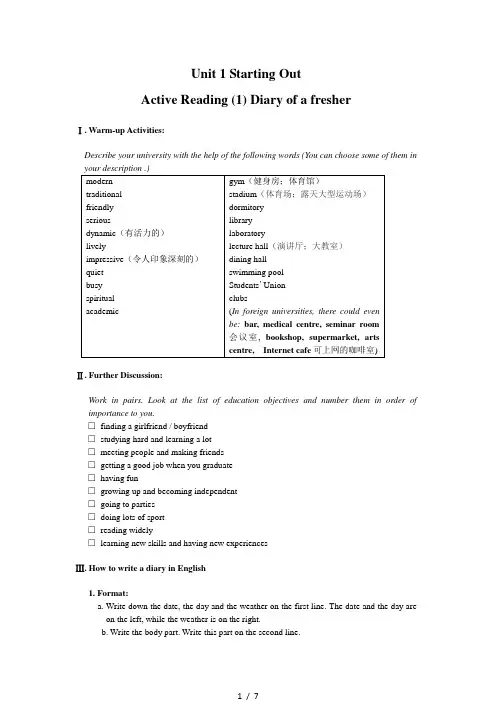
Unit 1 Starting OutActive Reading (1) Diary of a fresherⅠ. Warm-up Activities:Describe your university with the help of the following words (You can choose some of them inⅡ. Further Discussion:Work in pairs. Look at the list of education objectives and number them in order of importance to you.☐finding a girlfriend / boyfriend☐studying hard and learning a lot☐meeting people and making friends☐getting a good job when you graduate☐having fun☐growing up and becoming independent☐going to parties☐doing lots of sport☐reading widely☐learning new skills and having new experiencesⅢ. How to write a diary in English1. Format:a. Write down the date, the day and the weather on the first line. The date and the day areon the left, while the weather is on the right.b. Write the body part. Write this part on the second line.2. Person:Write the diary in the first person.3. Tense:a. Past tense;b. Present tense;c. Future tense.4. Order:Write the diary in chronological order.5. Style:Casual and informal: express a personal viewpoint with reactions, reflections and feelings.Ⅳ. Background Information & Culture Notes:1. A hall of residence(AmE dormitory): is a place where students live, often a large building,or a series of buildings with accommodation and some social facilities.2. A coffee morning: refers to an informational gathering with coffee, where people with acommon interest meet for an hour or so and get to know each other better.3. A gap year:is a year usually between finishing school and starting university or collegewhen you travel or work.4. A fresher’s fair: is an event when all the university clubs and societies try to attract newmembers.5.Ballroom dancing: is a type of dancing done by a man and a woman together, often in a6.Artificial intelligence(人工智能):is the ability of a machine to perform those activitiesthat are normally thought to require intelligence.Artificial intelligence Society:is a club for members who share the same interest in artificial intelligence.7.Bell ringing: is a musical activity which involves a group of six to ten people. Each personhas two bells, one in each hand and take turns to ring them. Each bell has a different musical mote, so the whole group can make musical melodies and harmonies.8.Extreme sports: (also known as "lifestyle sports" or "action sport") are a general term forsports featuring speed, height, danger or spectacular stunts. The sports have rooted in 1960s and have been growing since the late 1980s.bungee jumping rock climbing bull fighting free diving9.Choir is an organized company of singers, especially one performing church music orsinging in a church.Mozart Choir is a club for singer s to perform Mozart’s music.Ⅴ. Words & Expressions:1.gap: n.①a period of time between two events间隔,间断a gap in the conversation 谈话的间隙他们阔别20年后又见面了。
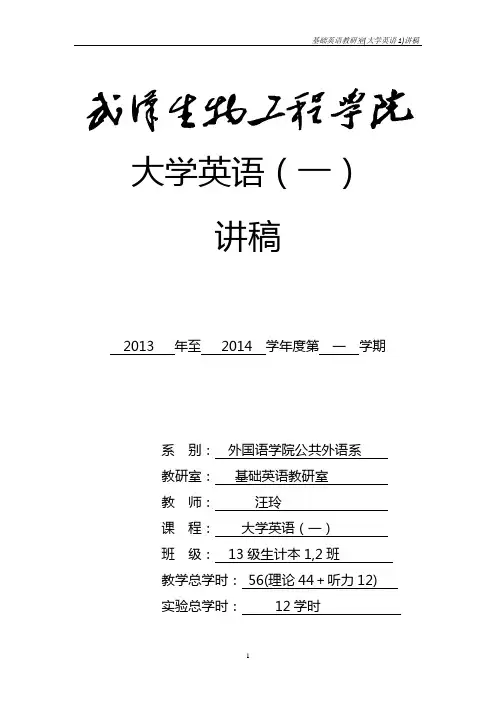
大学英语(一)讲稿2013 年至 2014 学年度第一学期系别:外国语学院公共外语系教研室:基础英语教研室教师:汪玲课程:大学英语(一)班级: 13级生计本1,2班教学总学时: 56(理论44+听力12)实验总学时: 12学时Unit One Growing Up8 periods Teaching Objectives:Ss will be able to:1. Appreciate the narrative skills demonstrated in the text (selection of details, repetition, coherence);2. Grasp the main idea (the essence of writing is to write what one enjoys writing) and structure of the text (narration in chronological sequence);3. Master the key language points and grammatical structures in the text.Emphasizes and Difficulties:1. Key words and phrases. (Ref. II-2- B)2. The comprehension of some difficult sentences; (Ref. II-2-C);3. The proper way to describe a person;Teaching Periods: 8 periodsTeaching ContentsI. Lead-in (25 minutes)1. Two choices out of the three:1)Have you ever seen the American soa p opera “Growing Pains”? Do you like it? Why? Growing Up Pains:the famous American TV series. It described the things happened in one family with several children. Tell us the things we suffered and enjoyed during our growing up.“Legally Blonde”2) Discussion: what is the proper way to describe a person?(Teacher divides the whole class into several groups, and each group chooses a person as its topic for describing, and then presents their description to the whole class.)3) Words and expressions of describing a person.(T puts some words and expressions on the blackboard.)II. Text Study (200 minutes)1. Global understanding1)Organization of the text:The story develops basically in chronological sequence. The teacher may have Ss scan Text A and find out all the time words, phrases and clauses (since my childhood in Belleville, until my third year in high school, late in the year, until the night before the essay was due, when I finished, next morning, two days passed, when I saw him lift my paper from his desk, when Mr. Fleagle finished, etc.).2)Think and answer.Ss form pairs to answer the questions on Page 8.a)Dividing the text into parts: Ask Ss to do Text Organization exercise p.9.1) (The text is made up of nine paragraphs. Each paragraph could be given a heading. Now write down the headings of the paragraphs of the text. Some have been done for the Ss.)⑵Baker’s impression of his new English teacher.(3) A topic that attracts Baker’s attention.(4) Vivid memories the topic brought back.(5)Baker’s sudden desire to write about that topic.(6)Anticipating punishment.(7) Mr. Fleagle’s announcement .(8) Classmate’s response to the essay.(9)What Baker discoveredb) Going through the text to figure out the textual structure with the clues in textc) Choosing a heading for each part to grasp the main idea of each part.2. In-depth reading:1) Cultural background grade school systemIn the United States, education is the responsibility of individual states, not of the federal government, so requirements may vary from one state to another. The following is a generalization:- kindergarten: under 5 years old- elementary / primary school (grades 1~6): 6~11 years old- junior high / middle school (grades 7~8): 12~13 years old- senior / high school (grades 9~12): 14~17 years oldcollege, institute, academy (学院), universityb. Questions1. Who was John Lennon?2. Which country was he from?3. What was his profession?4. Do you know any songs by him?5. Can you tell us anything about Lennon?c. Spaghetti and the proper way of eating itDefinitionSpaghetti is the Italian-style thin noodle, cooked by boiling and served with sauce. Unlike some Chinese noodles, it is not served in soup and will never taste pulpy (软乎乎、没有嚼劲的).Listen and PracticeRead the words given below and then listen to the passage. After listening to the passage, one student is required to come up and show the right way of eating spaghetti before the class.The Right Way of Eating Spaghetti 1. Hold the fork in your hand as if to poke the spaghetti. 2. Scoop up a small amount of spaghetti on your fork and raise it about 30cm above your plate. 3. Make sure the spaghetti on your fork is completely disconnected from the remainder on your plate.4. Put the prongs of the fork at an edge of the plate that is free of food.5. Quickly point the prongs of the fork straight down toward the plate and place the points onthe plate.6. Twirl the fork to gather the spaghetti around the prongs.7. With a quick scooping movement, gather up the roll around the prongs and place it in yourmouth.8. Gently gather up any stray spaghetti ends that don’t make it all the way into your mouth.3. Key words and phrasesanticipate: vt . expect (usu. followed by gerund or that-clause )以高兴或恐惧的心情期待所希望或预料的事发生,强调事先有所准备;eg. We anticipate that we shall hear from you again.N.B. 该动词所接的宾语可以是动名词,不可用不定式代替。
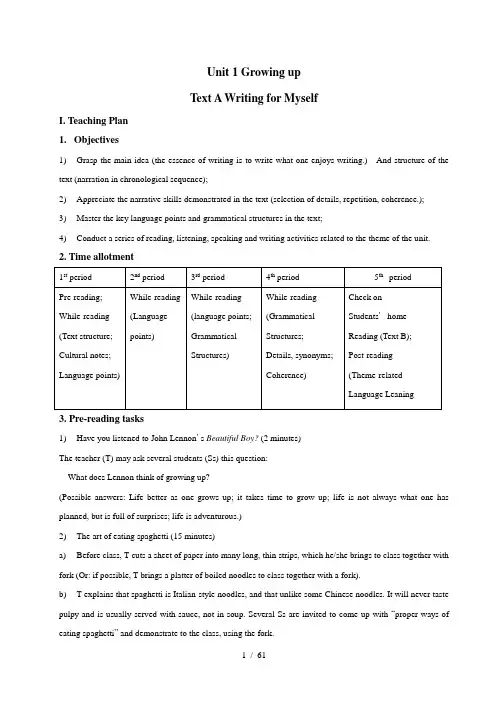
Unit 1 Growing upText A Writing for MyselfI. Teaching Plan1.Objectives1)Grasp the main idea (the essence of writing is to write what one enjoys writing.) And structure of the text (narration in chronological sequence);2)Appreciate the narrative skills demonstrated in the text (selection of details, repetition, coherence.);3)Master the key language points and grammatical structures in the text;4)Conduct a series of reading, listening, speaking and writing activities related to the theme of the unit. 2. Time allotment3. Pre-reading tasks1)Have you listened to John Lennon's Beautiful Boy? (2 minutes)The teacher (T) may ask several students (Ss) this question:__What does Lennon think of growing up?(Possible answers: Life better as one grows up; it takes time to grow up; life is not always what one has planned, but is full of surprises; life is adventurous.)2)The art of eating spaghetti (15 minutes)a)Before class, T cuts a sheet of paper into many long, thin strips, which he/she brings to class together with fork (Or: if possible, T brings a platter of boiled noodles to class together with a fork).b)T explains that spaghetti is Italian-style noodles, and that unlike some Chinese noodles. It will never taste pulpy and is usually served with sauce, not in soup. Several Ss are invited to come up with “proper ways of eating spaghetti” and demonstrate to the class, using the fork.c)T dictates the following passage to Ss (pre-teach some words like “poke”, “scoop”, “prong”, “twirl” if necessary):i.Hold the fork in your hand as if to poke the spaghetti.ii.Scoop up a small amount of spaghetti on your fork and raise it about 30 cm above your plate.iii.Make sure the spaghetti on your fork is completely disconnected from the remainder on your plate.iv.Put the prongs of the fork at an edge of the plate that is free of food.v.Quickly point the prongs of the fork straight down toward the plate and place the points on the plate.vi.Twirl the fork to gather the spaghetti around the prongs.vii.With a quick scooping movement, gather up the roll around the prongs and place it in your mouth.viii.Gently gather up any stray spaghetti ends that don't make it all the way into your mouth.d)T asks one S to come up and demonstrate the right way of eating spaghetti.3)T asks Ss the following questions:(8 minutes)__Would you enjoy writing “The Art of Eating Spaghetti”? Why or why not?__Why did Russell Baker enjoy writing “The Art of Eating Spaghetti”? (Hint: Para.4)__Look at the title of Text A, then find out in which paragraph a similar phrase appears. Read that paragraph carefully and explain in your own words what the author means by saying “write for myself”. (Hint: Para.5) 4. While –reading tasks1.Grasping the structure of the text: (15 minutes)1)Ss circle all the time words, phrases in Text A (They include: since my childhood in Belleville, until my third year in high school, until then, when our class was assigned to Mr. Fleagle for third-year English, late in the year, until the night before the essay was due, when I finished, next morning, two days passed, when I saw him lift my paper his desk… when Mr. Fleagle finished). When they finish, T asks several Ss to read aloud what they have circled.2)T draws Ss'attention to Organization Exercise 2 , reads its instructions, and asks them these two questions:__Refer to the time words/phrases/clauses you have just circled and tell from which point on Baker starts talking about his new experience. (Hint: the paragraph containing “later in the year”)__Starting from which paragraph does Baker stop writing about his new experience? (hint: the paragraph containing “when I finished” and “next morning”3)In this way Ss will be able to divide the text into 3 parts and sum up the main ideas.4)Several Ss report the main ideas they have summed up to the class.2.Cultural background---T explains the U.S. grade school system and how school teachers are dressed. (seeCultural Notes) (3 minutes)3.T explains language points and gives Ss practice. (see Language Study) (60 minutes)4.Grammatical structures. (25 minutes)1)T asks Ss to form pairs and ask each other questions based on Para. 2 using the structure “sb./ sth. is said/believed/reported to do/be”. T may offer the following model:__What kind of person is Mr. Fleagle?__He was said/reported/believed to be very formal, rigid and hopelessly out-of-date.Afterwards, a pair or two may repeat their questions and answers to the class.2)Ss do Structure Exercise 2 in the textbook.5.T draws Ss' attention to Writing strategy in Theme-related Language Learning Tasks, especially the part about details. (also see Text Analysis) T then asks the following questions:__In Part 1, what details are selected to show “I' d been bored with everything associated with English courses”?__In Part 1, what details are given to show that Mr. Fleagle was dull and rigid?__In Part 2, which sentences show that at first Baker was unwilling to write the essay?__In Part 3, the author didn't tell us directly that his essay was very good. By which sentences did he manage to give us the impression that his essay was very good? (12 minutes)6.Synonymous words or phrases in this text (see Text Analysis):1)T chooses one words from each group of synonyms listed in Text Analysis, and asks Ss to scan for respective synonyms. If Ss' findings are inconclusive, T may reveal those they have neglected.2)T may further provoke Ss' thinking by this question: Why does Russell Baker employ all these synonymous words and phrases? (15 minutes)7.When T and Ss come to the sentence “In the eleventh grade, at the eleventh hour as it were, I had discovered a calling.” In Para. 9, T may ask Ss to recall a similar sentence they have read. (Para.1, “The idea of becoming a writer had come to me off and on since my childhood in Belleville, but it wasn't until my third year in high school that the possibility took hold.”) By this T will show Ss the importance of coherence in writing. (5 minutes)5. Exercises1.Think alone: According to Mr. Fleagle, what is the very essence of the essay? (5 minutes)Then T invites several Ss to give their opinions. T may sum up by this sentence---The essence of good essay is to write what one enjoys writing about.2.T checks if Ss have done the rest of the after-text exercises in their spare time, and discusses somecommon errors that crop up. (10 minutes)3.T checks on Ss' home reading (Text B). (3 minutes)4.Ss do Part Iv: Theme-related Language Learning Tasks in class. (1 period)5.T asks Ss to prepare the next unit:1)Do the pre-reading task;2)Preview Text A. (2 minutes)6.Confusable phrases.Severe, stern & strictSevere: 作“严厉”解时,可以来形容人(severe father),人的面貌(severe look 严厉的神色),人的态度(the teacher is severe with his students.教师对学生很严厉。
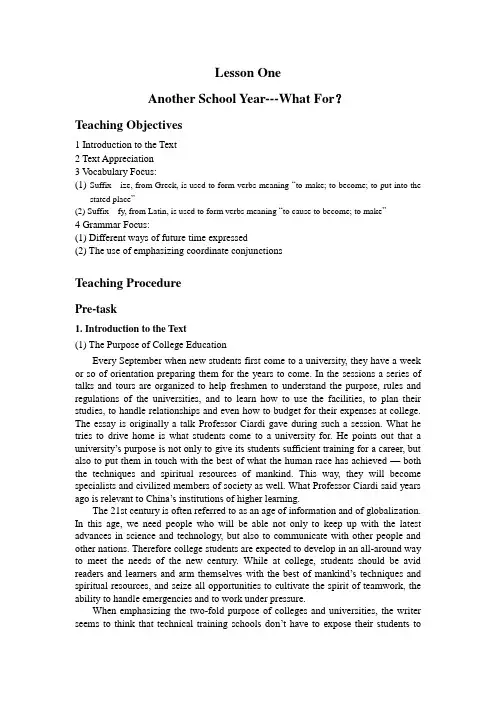
Lesson OneAnother School Year---What For?Teaching Objectives1 Introduction to the Text2 Text Appreciation3 V ocabulary Focus:(1) Suffix---ize, from Greek, is used to form verbs meaning “to make; to become; to put into thestated place”(2) Suffix---fy, from Latin, is used to form verbs meaning “to cause to become; to make”4 Grammar Focus:(1) Different ways of future time expressed(2) The use of emphasizing coordinate conjunctionsTeaching ProcedurePre-task1. Introduction to the Text(1) The Purpose of College EducationEvery September when new students first come to a university, they have a week or so of orientation preparing them for the years to come. In the sessions a series of talks and tours are organized to help freshmen to understand the purpose, rules and regulations of the universities, and to learn how to use the facilities, to plan their studies, to handle relationships and even how to budget for their expenses at college. The essay is originally a talk Professor Ciardi gave during such a session. What he tries to drive home is what students come to a university for. He points out that a university’s purpose is not only to give its students sufficient training for a career, but also to put them in touch with the best of what the human race has achieved — both the techniques and spiritual resources of mankind. This way, they will become specialists and civilized members of society as well. What Professor Ciardi said years ago is relevant to China’s institutions of higher learning.The 21st century is often referred to as an age of information and of globalization. In this age, we need people who will be able not only to keep up with the latest advances in science and technology, but also to communicate with other people and other nations. Therefore college students are expected to develop in an all-around way to meet the needs of the new century. While at college, students should be avid readers and learners and arm themselves with the best of mankind’s tech niques and spiritual resources, and seize all opportunities to cultivate the spirit of teamwork, the ability to handle emergencies and to work under pressure.When emphasizing the two-fold purpose of colleges and universities, the writer seems to think that technical training school s don’t have to expose their students toprofound ideas. We think that all schools, as well as colleges and universities, should aim at turning out useful and civilized members of society.(2) StyleAs it is originally a talk, the writer adopts a basically colloquial and familiar style. As you read, you feel as if the professor is talking to you face to face. To recreate the scene of his encounter with the tall boy in his office, he uses the direct speech. This way, the reader can imagine the ignorance and arrogance of the student. The sentence structure is generally not very complicated. But there are a few long and involved sentences in the second part of the text, for example, the last sentence in Paragraph 12. And the last paragraph consists of two very long ones.The tone in the first part is humorous and mildly sarcastic. The pharmacy major is referred to as “a beanpole with hair on top”, “this specimen” and “this particular pest”.2. Warm-up questions(1) Do you agree the point of view that universities are only for job training? Whatelse should a student strive for in a university?(2) How would you respond if your friend declares that he/she is only interested inlearning some job skill and therefore has no use for literature, philosophy, politics, history, art, music, etc.?Task- cycle1. ThemeThe author tries to clarify the purpose of a university: to put the students in touch with the best civilization that human race has created.2. StructurePart 1 (Paras.1- 8):The writer describes his encounter with one of his students.Part 2 (Paras.9-14):The author restates what he still believes to be the purpose of a university: putting its students in touch with the best civilizations the human race has created.3. Detailed study of the text (In this part, students are asked to take part in various activities.)(1) Let me tell you one of the earliest disasters in my career as a teacher.Let me tell you something that happened when I first became a teacher. It was one of the exasperating experiences in the first days of my teaching career.The word “disaster” often means “an unexpected event, such as a very bad accident, a flood or a fire that kills a lot of people or causes a lot or damage”. Here, used informally, it means “a complete failure”. The writer exaggerates the situation and uses the word humorously.(2) …I was fresh out of graduate school starting my first semester at theUniversity of Kansas City.…I was fresh out of graduate school starting my first semester at the University of Kansas City.be fresh out of/from sth. : to have just come from a particular place; to have just had a particular experience, e.g.Students fresh from collegeAthletes fresh from their success at the Ninth National Games(3) News as I was to the faculty, I could have told this specimen a number ofthings.Though I was a new teacher, I knew I could tell him what he could but did not say to the student.Note that the writer now referred to the student as a specimen in a humorous way, meaning he was typical of those students who came to a university just to get training for a career, as if he were typical of a certain species of animal.new to sth. : not yet familiar with sth. because you have only just started, arrived, etc.(4) I could have pointed out that he had enrolled, not in a drugstore-mechanicsschool, but in a college and that at the end of his course meant to reach for a scroll that read Bachelor of Science.I could have told him that he was now not getting training for a job in a technical school but doing a B.S. at a university.mean to do sth. : to intend to do sth.reach for sth. : to try to obtain sth.read Bachelor of Science: to have Bachelor of Science written on the certificate.(5) It would certify that he had specialized in pharmacy, but it would furthercertify that he had been exposed to some of the ideas making has generated within its history.The B.S. certificate would be official proof that the holder had special knowledge of pharmacy, but it would also be proof that he/she had been exposed to some profound ideas of the past.certify that … : to state officially, especially in writing that … , e.g.This is to certify that Ms. Li Lin worked at the IBM Beijing Office from January 1998 to June 2000.specialize in :to limit all or most of one’s study, business, etc. to a particular activity or subject, e.g.Professor Zhang specializes in American drama.My sister specializes in contract law.At age 30, he started a company specializing in home computers.generate: to produce or create sth. ,e.g.They have a large body of young people who are capable of generating new ideas. This machine can generate electricity in case of a power failure.(6) I could have told him all this, but it was fairly obvious he wasn’t going to bearound long enough for it to matter.I didn’t actually say all this to him, because I didn’t think he would stay at college very long, so it wouldn’t be important whether or not he knew what university education was for.be around: to be present in a place; to be availablematter (to sb.): to be important or have an important effect on sb. /sth. , e.g.It doesn’t matter whether or not you agree. My mind is made up.Does it matter if I write in pencil?(7) Nevertheless, I was young and I had a high sense of duty and I tried to put itthis way…Instead of telling him the importance of an all-round education, I tried to convince him from a very practical point of view.(8) You will see to it that the cyanide stays out of the aspirin, that the bull doesn’tjump the fence, or that your client doesn’t go to the electric chair as a result of your incompetence.You have to take responsibility for the work you do. If you’re a pharmacist, you should make sure that aspirin is not mixed with poisonous chemicals. As an engineer, you shouldn’t get things out of control. If you become a lawyer, you should make sure an innocent person is not sentenced to death because you lack adequate legal knowledge and skill to defend your client.be employed in doing sth. : (written) to spend your time doing sth. , e.g.The old man’s days were employed in reading, writing, and doing Chinese boxing. The old lady was busily employed in knitting sweaters for her grandchildren.see to it that: to make sure that, e.g.Can you see to it that all the invitations are delivered today?I’ll see to it that everything is ready before the guests arrive.average out to: (informal) to come to an average or ordinary level or standard, especially after being higher or lower, e.g.Meals at the university average out to about 10 yuan per day.The restaurant’s monthly profits averaged out at 30% last year.(9) Along with everything else, they will probably be what puts food on yourtable, supports your wife, and rears your children.In addition to all other things (such as satisfaction) these professions offer, they provide you with a living so that you can support a family-wife and children. (10) Will the children ever be exposed to a reasonably penetrating idea at home? Will your children ever hear you talk about something profound at home?be exposed to (usually, a new idea or feeling): to be given experience of it, or introduced to it, e.g.To learn more about the world we live in, we should be expose to different cultures.Studying abroad, he was exposed to a new way of life.(11) Will you be presiding over a family that maintains some contact with the great democratic intellect?Will you be head of a family who brings up kids in a democratic spirit?preside over: to be in charge or to control a meeting or an event, here used humorouslymaintain contact with: to keep in touch with, here used figuratively(12) Will there be a book in the house?Will you be reading serious books (not just popular fiction)?(13) Will there be a painting a reasonably sensitive man can look at withoutshuddering?What kind of pictures will you put up in your house? Will you have a painting in your house that shows some taste?(14)Me, I’m out to make money.Be out do sth. /for sth. : to be trying to get or do sth. , e.g.The company is out to break in to the European market.Look out for such end-of-the-year sales. These shops are out to trick you into buying what you don’t need.(15) “I hope you make a lot of it,” I told him, “because you’re going to be badlystuck for something to do when you’re not signing checks.”Note the sarcastic tone of the writer. In spite of what he had said, the student didn’t seem to be convinced. What the writer means here is something like this: If you don’t have any goal in life apart from making money to satisfy your desire for material riches, go ahead and make a lot of it.be stuck for sth : not to know what to do in a particular situation, e.g.In the middle of the speech, he was stuck for words (= he didn’t know how to go on).(16) If you have no time for Shakespeare, for a basic look at philosophy, for thecontinuity of the fine arts, for that lesson of man’s development we call history-then you have no business being in college.If you don’t want to improve your mind and broaden your horizon by studying a little literature, philosophy and the fine arts and history, you shouldn’t be studying here at college.have no business doing sth. /have no business to do sth. : to have no right to do sth. , shouldn’t have been/be doing sth. , e.g.You’ve no business telling me what to do.He has no business criticizing her about her make-up.(17) You are on your way to being that new species of mechanized savage, thepush-button Neanderthal.You will soon become an uneducated, ignorant person who can only work machines and operate mechanical equipment (one who doesn’t know anything about literature, music, the fine arts, culture in general, etc.).on the/one’s way to: on the point of experiencing or achieving, e.g.She is on the way to becoming a full professor.That bright young man is on his way to being the sales manager of the company. Nancy is well on her way to a nervous breakdown.new species of mechanized savage:new type of humans who are intellectually simple and not developed and who can only work machinesthe push-button Neanderthal:an uneducated, ignorant person who can only use/operate machines by pushing the buttons.(18) Our colleges inevitably graduate a number of such life forms, but it cannotbe said that they went to college; rather the college went through them-without making contact.A number of such push-button savages get college degrees. We cannot help that. But even with their degrees, we can’t say that these people have received a proper college education. It is more accurate to say that they go through college without learning anything.life forms: used sarcastically, meaning these people are living creatures, but can’t think or reasongo through (a person) (like a dose of salts):(of food, etc.) to be quickly excreted/to pass through the body as waste matter without being digested; here, used figuratively and sarcastically(19) Not one gets to be a human being unaided.No one can grow up to be a civilized person without the help of others.get to be/to do sth.: to reach the point at which you are, feel, know, etc. sth. , e.g. Once you get to know her better, you’ll realize she is a compassionate person.His absent-mindedness is getting to be a big problem.(20) There is not time enough in a single lifetime to invent for oneself everythingone needs to know in order to be a civilized human.To become a civilized person, you need to acquire the knowledge and develop the culture a civilized society needs. One lifetime is too short to create an environment for you to become civilized.a single lifetime: the time during which a person is alivea civilized human: a person who is pleasant, charming and without roughness of manner(21) You pass the great stone halls of, say, M.I.T., and there cut into the stone arethe names of the scientists.If you pass the great stone hall of a university, M.I.T. (Massachusetts Institute of Technology) for example, you’ll see the names of the scientists cut into the stone.(22) The chances are that few, if any, of you will leave your names to be cut intothose stones. Yet any of you who managed to stay awake through part of a high school course in physics, knows more about physics that did many of those great scholars of the past.Only very few, if any at all, of you will turn out to be great scientists and have your names cut into those stones. But if you were attentive enough in your high school physics class, any of you knows more about physics that many of those scientists whose names are cut into the stones.(the) chances are: it is likely(23) You know more because they left you what they knew, because you can startfrom what the past learned for you.You know more about physics not because you’re more talented that those scholars of the past, but because they left their knowledge to you, and because everything you first learn is what people learnt in the past. In other words, all human knowledge has been accumulated by people living in the past and has been passed on to us. You learn all this before you do any original research, or any research of your own.(24) And as this is true of the techniques of mankind, so it is true of mankind’sspiritual resources.This is the way we learn and develop the techniques of mankind. This is also how we inherit and advance mankind’s spiritual resources.Be true of (a person or a situation) : to apply to, e.g.It’s a wonderful opera. The music is superb. The same is true of the acting.The young tend to look ahead while the old like to look back upon the past. This is true in all nations(25) When you have read a book, you have added to your human experience. When you have read a book, you have enriched your life.(26) Read Homer and your mind includes a piece of Homer’s mind.When you read Homer’s works, you are sure to grasp some of his insights.(27) Through books you can acquire at least fragments of the mind and experience of Virgil, Dante, Shakespeare-the list is endless.Through reading their books, you can at least grasp a bit of the thinking and experience of such literary giants as Virgil, Dante, Shakespeare-there have been so many great thinkers and writers that it’s impossible to list them all here.(28) For a great books is necessarily a gift; it offers you a life you have not thetime to live yourself, and it takes you into a world you have not the time to travel in literal time.Because a great book is something given to us to enrich our lives. It presents to you a kind of life you don’t have a chance to experience yourself, and it describes for you places you don’t have time actually to visit.In literal time: in reality(29) A civilized mind is, in essence, one that contains many such lives and many such worlds.Basically, a cultured and educated person should know about such great variety of lives and worlds.In essence: basically, by nature, e.g.Hs is in essence an outgoing person.In essence they were asking for the impossible.(29) The faculty, by its very existence, say implicitly: “We have been aided bymany people, and by many books, in our attempt to make ourselves some sort of storehouse of human experience.”The existence of the faculty of the liberal arts college itself says in an implied way: “In our effort to make our faculty a place where our students can experience a variety of life they don’t have time to live themselves, we get a lot of help from many people and books, present and past…”(30) “We are here to make available to you, as best we can, that expertise.”“Our role/job/task is to do our best provide such knowledge for you (to become both specialists and civilized humans).”(be) here to do sth. : used to show your role in a situation, e.g.We’re all here to help you.Post-task1. Discussion(1) As a college student, what do you think of the question put forward by the author?Give your own answer to the question, and compare it with th e author’s.(2) After finishing reading the whole text, how do you evaluate the author’s answer? 2. Written work:Suppose you are the writer: write in about 130 words what you said to the tall student about the purpose of a university.Your retelling should contain three parts.1. How you came to talk about it2. What you said3. What you pointed out in conclusion。
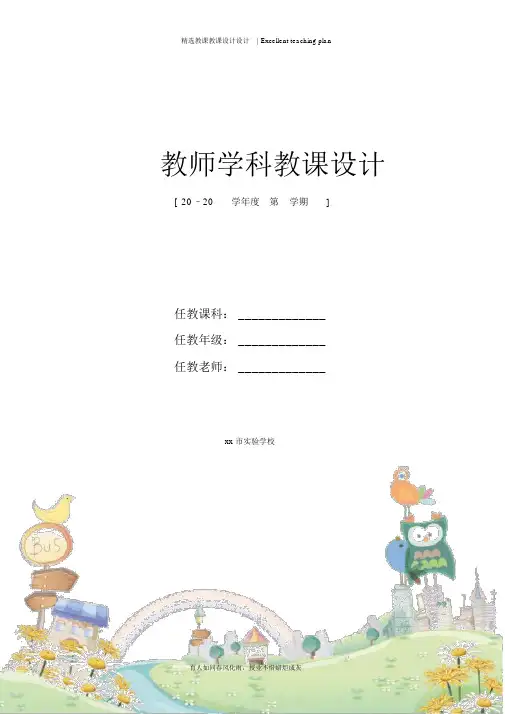
精选教课教课设计设计| Excellent teaching plan教师学科教课设计[ 20–20学年度第__学期]任教课科: _____________任教年级: _____________任教老师: _____________xx市实验学校Unit One Growing upText A Writing for MyselfLanguage study1. off and on : adv.In an intermittent manner: slept off and on last night.2.take hold : to start to have an effectThe fever was beginning to take hold.3.associate: To connect or join together; combine; To connect in the mind or imagination associate one thing with anotherWe associate China with the Greet Wall.What do you associate with such a heavy snow? 4. turn out:a.to shut off: turned out the lights.b.to arrive or assemble, as for a public event or entertainment:A large group of protesters have turned out.c. To produce, as by a manufacturing process; make: an assembly line turning out cars.d. To be found to be, as after experience or trial:The rookie turned out to be the best hitter on the team. e. To end up; result: The cake turned out beautifully.f. To equip; outfit: troops that were turned out beautifully.g. Informal To get out of bed.h. To evict; expel: The tenants were turned out.5.agony : The suffering of intense physical or mental pain.His last agony was over. 他临死的挣扎已经过去了。
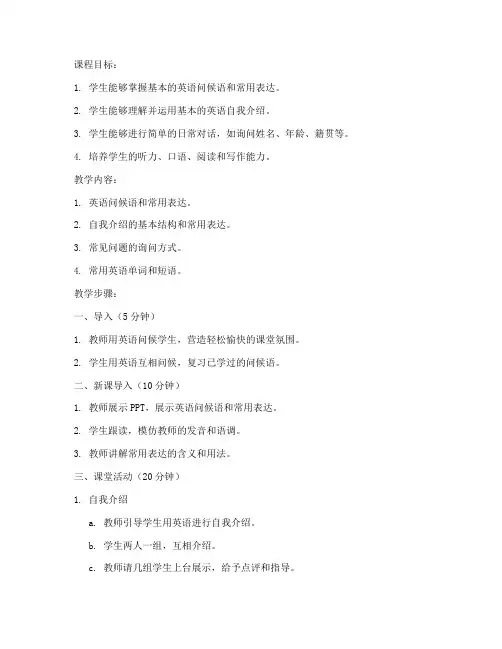
课程目标:1. 学生能够掌握基本的英语问候语和常用表达。
2. 学生能够理解并运用基本的英语自我介绍。
3. 学生能够进行简单的日常对话,如询问姓名、年龄、籍贯等。
4. 培养学生的听力、口语、阅读和写作能力。
教学内容:1. 英语问候语和常用表达。
2. 自我介绍的基本结构和常用表达。
3. 常见问题的询问方式。
4. 常用英语单词和短语。
教学步骤:一、导入(5分钟)1. 教师用英语问候学生,营造轻松愉快的课堂氛围。
2. 学生用英语互相问候,复习已学过的问候语。
二、新课导入(10分钟)1. 教师展示PPT,展示英语问候语和常用表达。
2. 学生跟读,模仿教师的发音和语调。
3. 教师讲解常用表达的含义和用法。
三、课堂活动(20分钟)1. 自我介绍a. 教师引导学生用英语进行自我介绍。
b. 学生两人一组,互相介绍。
c. 教师请几组学生上台展示,给予点评和指导。
2. 常见问题的询问方式a. 教师展示PPT,展示常见问题的询问方式。
b. 学生跟读,模仿教师的发音和语调。
c. 教师讲解询问方式的含义和用法。
四、巩固练习(15分钟)1. 听力练习a. 教师播放听力材料,学生认真听并回答问题。
b. 教师讲解听力材料的内容,并纠正学生的错误。
2. 口语练习a. 教师提出问题,学生用英语回答。
b. 教师请几名学生上台展示,给予点评和指导。
五、总结与作业(5分钟)1. 教师总结本节课的重点内容。
2. 学生回顾所学知识,巩固记忆。
3. 布置作业:复习本节课所学内容,并完成课后练习。
教学评价:1. 学生能够熟练运用英语问候语和常用表达。
2. 学生能够进行简单的自我介绍和日常对话。
3. 学生能够正确回答问题,理解听力材料的内容。
4. 学生能够积极参与课堂活动,提高英语听说能力。
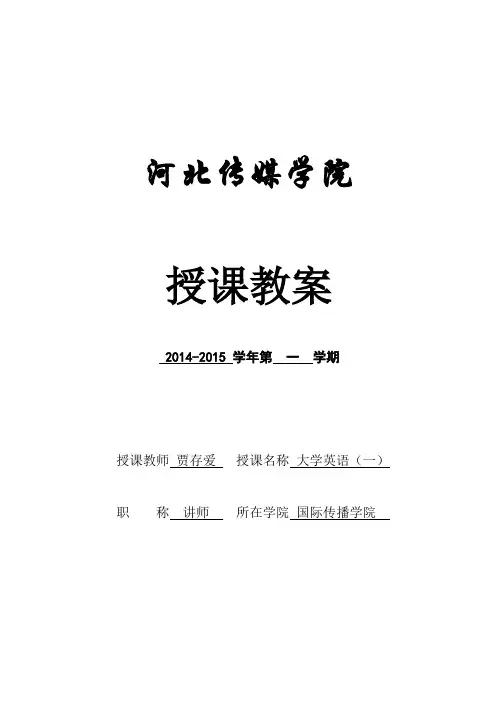
河北传媒学院
授课教案
2014-2015 学年第一学期
授课教师贾存爱授课名称大学英语(一)职称讲师所在学院国际传播学院
编写教案的说明与要求:
1、大学教案是指按照一定内容和形式,设计编写的可供操作的教学实施方案,它承载课堂教学的组织管理信息。
2、由于课程性质、内容的差异性,对教案的编写不要求统一的模式,但必须要有教学内容、教学目的、教学过程三个基本项目。
3、确定教学目的的关键是适度,教学过程的设计应符合学生的认知规律,调动学生主动学习;要紧紧围绕课题的重点、难点来选定教学方法;作业选择的目的性、针对性、典型性要强。
河北传媒学院授课教案。
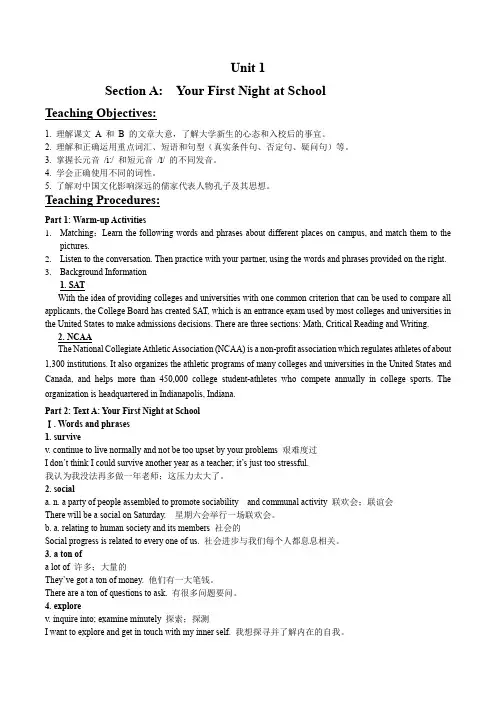
Unit 1Section A: Your First Night at SchoolTeaching Objectives:1. 理解课文A 和B 的文章大意,了解大学新生的心态和入校后的事宜。
2. 理解和正确运用重点词汇、短语和句型(真实条件句、否定句、疑问句)等。
3. 掌握长元音/i:/ 和短元音/I/ 的不同发音。
4. 学会正确使用不同的词性。
5. 了解对中国文化影响深远的儒家代表人物孔子及其思想。
Teaching Procedures:Part 1: Warm-up Activities1.Matching:Learn the following words and phrases about different places on campus, and match them to thepictures.2.Listen to the conversation. Then practice with your partner, using the words and phrases provided on the right.3.Background Information1. SATWith the idea of providing colleges and universities with one common criterion that can be used to compare all applicants, the College Board has created SAT, which is an entrance exam used by most colleges and universities in the United States to make admissions decisions. There are three sections: Math, Critical Reading and Writing.2. NCAAThe National Collegiate Athletic Association (NCAA) is a non-profit association which regulates athletes of about 1,300 institutions. It also organizes the athletic programs of many colleges and universities in the United States and Canada, and helps more than 450,000 college student-athletes who compete annually in college sports. The organization is headquartered in Indianapolis, Indiana.Part 2: Text A: Your First Night at SchoolⅠ. Words and phrases1. survivev. continue to live normally and not be too upset by your problems 艰难度过I don’t think I could survive another year as a teacher; it’s just too stressful.我认为我没法再多做一年老师;这压力太大了。
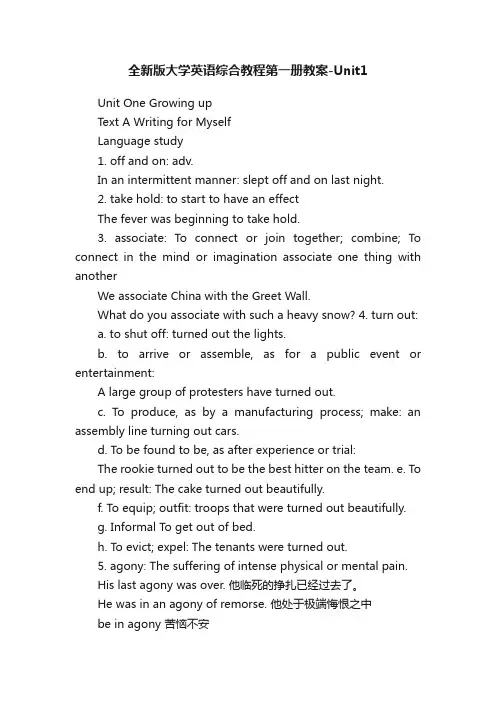
全新版大学英语综合教程第一册教案-Unit1Unit One Growing upText A Writing for MyselfLanguage study1. off and on: adv.In an intermittent manner: slept off and on last night.2. take hold: to start to have an effectThe fever was beginning to take hold.3. associate: To connect or join together; combine; To connect in the mind or imagination associate one thing with anotherWe associate China with the Greet Wall.What do you associate with such a heavy snow? 4. turn out:a. to shut off: turned out the lights.b. to arrive or assemble, as for a public event or entertainment:A large group of protesters have turned out.c. To produce, as by a manufacturing process; make: an assembly line turning out cars.d. To be found to be, as after experience or trial:The rookie turned out to be the best hitter on the team. e. To end up; result: The cake turned out beautifully.f. To equip; outfit: troops that were turned out beautifully.g. Informal To get out of bed.h. To evict; expel: The tenants were turned out.5. agony: The suffering of intense physical or mental pain.His last agony was over. 他临死的挣扎已经过去了。
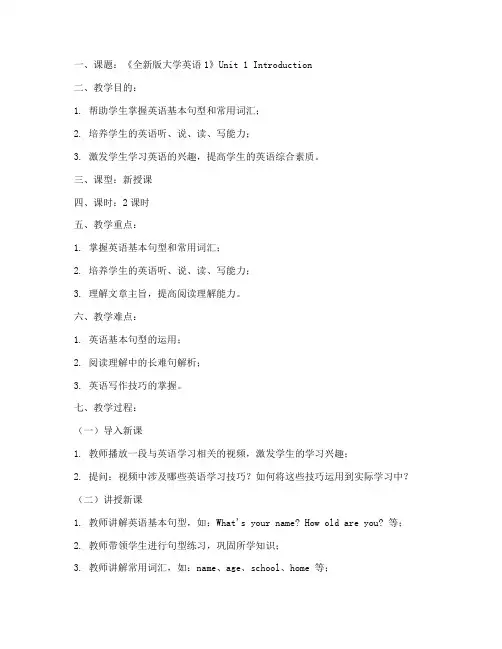
一、课题:《全新版大学英语1》Unit 1 Introduction二、教学目的:1. 帮助学生掌握英语基本句型和常用词汇;2. 培养学生的英语听、说、读、写能力;3. 激发学生学习英语的兴趣,提高学生的英语综合素质。
三、课型:新授课四、课时:2课时五、教学重点:1. 掌握英语基本句型和常用词汇;2. 培养学生的英语听、说、读、写能力;3. 理解文章主旨,提高阅读理解能力。
六、教学难点:1. 英语基本句型的运用;2. 阅读理解中的长难句解析;3. 英语写作技巧的掌握。
七、教学过程:(一)导入新课1. 教师播放一段与英语学习相关的视频,激发学生的学习兴趣;2. 提问:视频中涉及哪些英语学习技巧?如何将这些技巧运用到实际学习中?(二)讲授新课1. 教师讲解英语基本句型,如:What's your name? How old are you? 等;2. 教师带领学生进行句型练习,巩固所学知识;3. 教师讲解常用词汇,如:name、age、school、home 等;4. 教师引导学生进行词汇练习,提高词汇运用能力;5. 教师带领学生阅读课文,讲解文章主旨和段落大意;6. 教师解析阅读理解中的长难句,帮助学生提高阅读理解能力;7. 教师讲解英语写作技巧,如:如何组织文章结构、如何运用过渡词等。
(三)巩固练习1. 教师组织学生进行句型练习,巩固所学知识;2. 教师组织学生进行词汇练习,提高词汇运用能力;3. 教师组织学生进行阅读理解练习,提高阅读理解能力;4. 教师组织学生进行英语写作练习,提高写作技巧。
(四)归纳小结1. 教师总结本节课所学内容,强调重点和难点;2. 教师提醒学生在课后进行复习,巩固所学知识。
(五)作业安排1. 复习本节课所学英语基本句型和常用词汇;2. 阅读课文,完成课后练习;3. 按照所学写作技巧,写一篇英语短文。
八、板书设计:全新版大学英语1 Unit 1 Introduction一、英语基本句型:1. What's your name?2. How old are you?3. Where do you come from?4. What do you do?二、常用词汇:1. name2. age3. school4. home三、阅读理解:1. 理解文章主旨;2. 解析长难句;3. 提高阅读理解能力。
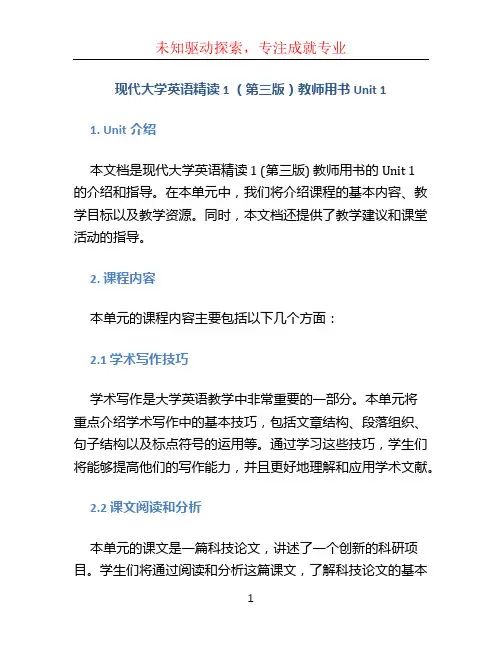
现代大学英语精读1 (第三版)教师用书 Unit 11. Unit介绍本文档是现代大学英语精读1 (第三版) 教师用书的Unit 1的介绍和指导。
在本单元中,我们将介绍课程的基本内容、教学目标以及教学资源。
同时,本文档还提供了教学建议和课堂活动的指导。
2. 课程内容本单元的课程内容主要包括以下几个方面:2.1 学术写作技巧学术写作是大学英语教学中非常重要的一部分。
本单元将重点介绍学术写作中的基本技巧,包括文章结构、段落组织、句子结构以及标点符号的运用等。
通过学习这些技巧,学生们将能够提高他们的写作能力,并且更好地理解和应用学术文献。
2.2 课文阅读和分析本单元的课文是一篇科技论文,讲述了一个创新的科研项目。
学生们将通过阅读和分析这篇课文,了解科技论文的基本结构和写作技巧,同时也能够培养他们的科技文献阅读习惯以及科学研究的思维方式。
2.3 词汇学习与应用在本单元中,我们还将介绍一些与科技和创新相关的词汇。
通过学习这些词汇并进行相关的练习,学生们将能够更好地理解和应用这些词汇,提高他们的词汇量和词汇应用能力。
3. 教学目标通过学习本单元,学生们将达到以下教学目标:•掌握学术写作的基本技巧,能够写出结构清晰、逻辑严谨的学术文章;•熟悉科技论文的基本结构和写作方式,能够进行科技文献的阅读和分析;•提高科技和创新相关的词汇量和词汇应用能力;•发展批判性思维和科学研究的思维方式;•培养科技文献阅读习惯和科研工作的兴趣。
4. 教学建议为了更好地达到教学目标,以下是一些建议用于教学过程中:4.1 创设互动性强的学习环境利用课堂教学和小组讨论等形式,创设一个互动性强的学习环境,激发学生的积极性和主动性。
可以引导学生们分享自己的观点和体验,促进学生之间的交流和合作。
4.2 激发学生的学习兴趣在教学过程中,可以选取一些与学生日常生活和实际经验相关的例子和案例,以此激发学生的学习兴趣。
例如,可以分享一些有关科技创新和科学研究的新闻和故事,让学生们能够更好地理解和应用所学的知识。
《综合英语(第一册)》电子教案Unit1CollegelifeUnit1 College lifePeriod: 2Teaching Content: Unit1 College life (1)Listening and Speaking ,Reading Text AAims of Teaching1. To improve the listening and speaking abilities of Ss’2. To improve Ss’ reading ability.Main points in teaching1. Understand the main ideas of Text A and master the useful sentence structures, words and expressions.2. Develop ss’ basic language skills by listening and speaking.Difficult points in teachingUnderstanding of some difficult sentencesTeaching procedures:The first periodStep1 Lead-in1.This is the first class of the new semester. I haven’t met my students before, so it is the first time that we’ve met each other. First, I’ll break the ice by introducing myself to the students. Then, I’ll ask them what kind of college life they hope for? What’s their impression on the college? What are they going to do after graduation? hoping that they can learn a lot and practice what they have learned into practice so that they can lay a very good foundation for their future professional careers, and they can enjoy their college life.2.Some requirements for ss1) Each student will be required to make a report at thebeginning of class2) All students are divided into 10 learning groups, with 4 students a group and a group reader will be chosen by themselves3. Tips on how to learn English well at collegeStep2 Listening1. Activity 1 Sound Recognition2. Activity 2 Conversation3. Activity 3 PassageQuestions and Answers1. Q: What is the weather like in Britain?A: It is cool in summer and warm in winter.2. Q: When do the winds bring cool air to Britain?A: In summer.3. Q: Why isn’t there much difference between the summer and winter weather?A: Because the winds from the west blow Britain all the year.4. Q: In which part of Britain is there less rain?A: In the east.5. Q: What is the passage mainly talk about?A: The weather in Britain.Step3 SpeakingThis activity mainly focuses on going over some useful expressions, and how to use them in a real dialog1. Activity 1A: Good morning, Wang Xiaoping.B: Good morning, Huang Linwei.A: How are you this week?B: Just fine. Thank you. And you?A: I’m fine, too. Thank you.A: Hello, Jane.B: Hello, David.A: How are you doing these days?B: Fine, thanks. How about you?A: I’m fine, too. Thank you.B: Is Grace well now?A: She is very well. She is now in China.B: That’s good.The second periodStep4: DiscussionWhat kind of college students do you expect to be?S1:Before I entered the college, I had a dream that I could become the top student in my class. When I woke up, I was determined that I should try my best to make my dream come true. So now I study very hard, and I am sure that my dream will come true some day.S2:After I came to the college, I think that I should develop myself in every field. First, I should study well, and then I should take most of the students’ activities if I am free. I hope that I can become the chairma n of the students’ union of our college, because I can have more chances for practice. In that way, I can learn much more.S3:I hope that I can study well at college. For example, I can read a lot of books, learn a lot from my teachers and classmates, pass every examination and become one of the top students in my class.S4:I hope that I can fully develop myself. First, I can learn as much as I can and pass all the examinations easily. Then, I can make a lot of friends on and off campus so that I can easily get a job after my graduation.Step 5: Fast reading1 Ask ss to read Text A as fast as they can and get the general idea of the passage. Then finish the “reading comprehension” on p82. Close books and concentrate on the recording of Text A3. Read the text aloudStep6 Homework1. Recite the new words on Text A and understand Text A2. Finish off Exs on p10-13。
教学目标:1. 让学生掌握基本的英语问候语和自我介绍的表达方式。
2. 培养学生运用英语进行日常交流的能力。
3. 增强学生的英语学习兴趣,提高学生的英语口语水平。
教学重点:1. 英语问候语和自我介绍的表达。
2. 基本的英语口语交际技巧。
教学难点:1. 学生在口语表达中正确运用语法和词汇。
2. 克服学生在口语表达中的紧张心理。
教学准备:1. 教学课件2. 英文歌曲3. 词汇卡片4. 图片或视频素材教学过程:一、导入(5分钟)1. 播放英文歌曲《Hello》,让学生在轻松愉快的氛围中进入课堂。
2. 教师用简单的英语问候学生,并询问他们的名字,让学生模仿。
二、新授(20分钟)1. 词汇教学:- 教师展示词汇卡片,如:Hello, Hi, Good morning, My name is, I am from...- 学生跟读并模仿。
2. 句型教学:- 教师示范自我介绍的表达方式,如:My name is... I am from... I am a student. What's your name? I am...- 学生分组练习,互相介绍。
3. 口语练习:- 教师设置情景,如:在机场、车站等场合,让学生运用所学词汇和句型进行对话。
- 学生分组进行角色扮演,巩固所学知识。
三、巩固(15分钟)1. 词汇和句型复习:- 教师提问,学生回答,检查学生对词汇和句型的掌握情况。
2. 小组讨论:- 教师提出问题,如:“How do you introduce yourself in English?”让学生分组讨论,并派代表分享。
四、总结(5分钟)1. 教师总结本节课所学内容,强调重点和难点。
2. 学生分享学习心得,提出自己在学习过程中遇到的问题。
五、作业布置(5分钟)1. 复习本节课所学词汇和句型。
2. 用所学知识进行自我介绍,并记录下来。
教学反思:本节课通过歌曲导入、词汇和句型教学、口语练习、巩固和总结等环节,让学生在轻松愉快的氛围中掌握基本的英语问候语和自我介绍的表达方式。
Module 1 Unit 1 I’m Sam一、Teaching aims:1、功能:问候和道别/自我介绍2、语言:Hello. Hi. Hello,I’m… Goodbye、Bye-bye,Good morning.能运用“Hello!I’m…”进行问候,并对此作出回应;3、词汇:hello (hi), I am (I’m), goodbye(bye-bye).4、能听懂、会说本课对话;二、Teaching stress and difficulties:自我介绍,以及运用“Good morning, Goodbye!”向他人告别。
三、Teaching procedures:Step1问候1、教师在走进教室时热情地向同学们打招呼说:“Hello.”或Hi.与近处的同学握手,向远处的同学挥手。
竖起大拇指表扬那些用英语向老师打招呼的同学说:“Very good!Well done!”或“Clever boy/girl!”2、用英语告诉学生本人名字,边将名字写在黑板上,边说:I’m Ms Wei.Step2听音指图1.打开并举起书,让学生看到练习。
指着各幅图用中文问学生图中的情景(校园中Sam,Daming,Amy和Lingling在介绍他们自己;在离开学校时,他们互相道别)。
问他们认为图片上的孩子来自哪里。
他们是高兴还是不高兴?每幅图上的孩子在说什么?2.放录音或读对话。
学生看书听录音。
放录音时教师要举起书指着图上说相应话语的人物。
再放录音,要求学生们指着相应的说话的人物。
Step3听音说话1.读出前两幅图的对话,要求学生跟读。
2.向学生解释老师将以故事中不同人物的身份来介绍自己。
每次老师说:“He llo,I’m(人物的姓名)他们要回答:“Hel1o,(同一人物的姓名)。
”举例:老师: Hello,I’m Lingling. 学生: Hello, Lingling.3.用Sam和Amy做更多的例子。
新目标大学英语综合教程第一册Unit1Collegelife教案Unit1 College LifeCultural Background or Related InformationGoing to college is one of our great dreams, After having studied hard for many years, this dream comes true at last.Then,what kind of college life should college ss hope for? Different ss may have different opinions about it. Almost all the college ss hope that they can learn a lot and practise what they have learned into practice so that they can lay a very good foundation for their future professional careers. They also hope they can enjoy their future life in many ways, such as making as many friends as possible, enjoy such entertainments as singing, dancing, listening to music, watch TV programs and seeing great movies. Besides, they hope that they can do some part-time jobs or join some organizations so that they can be well trained to face to any severe challenges after their graduation.No matter what college life they have, they all hope that their college life will be vivid, interesting, colorful, exciting and unforgettable and they can benefit a lot.I .Analysis of Teaching Material1.Status and FunctionThis unit is the first one of this book. So if ss can learn this unit well, it will be helpful to make ss learn the rest of this book.The content of my teaching is a part of this unit. The topic is "tCollege Life". Such topic is related to ss' daily life. The ss are new to college so they don't know much about college life. So it is helpful to raise learning interest of ss.2. Teaching Aims and Demands(1).Knowledge ObjectTo understand the main idea of the text.(2).Ability ObjectTo improve ss' ability of listening, speaking, reading and writing.(3).Moral objectTo help ss to be a happy college student.3. Teaching Key Points and DifficultyTo master some new words and Language Focus of text A.To train ss how to use them by reading and writing.4. Teaching TimeTwo periodsⅡ.Teaching MethodsThe Situation Language Teaching MethodStudent-centered T eaching MethodTask-based Language Teaching MethodActivity-based Teaching Method (individual work, pair work,group work and class work)Ⅲ.Learning MethodsBasic Learning MethodPractice Learning MethodⅣ.Teaching StepsStep1.Greet the classT: Good morning ,boys and girls.Ss: Good morning.T: Welcome to our college, My name is --, I hope we'll get along very well. I'm not only your teacher ,but can be your friend. I'll give my best wishes to you.Ss: Thank you.... ...Step2. Speaking Practice(get to know each other)Step3. Listening Practice(Three activities should be done)①. Sound recognition.②. Listen to conversations and fill in blanks.③ .Listen to a passage and choose correct answers.Step4.Reading①.Lead-in Activity:Discussion .There are two questions to discuss.Q1:What kind of college life shouldexpect to be .Q2:What do you hope to do at college?②.Understanding the text .Choose the best answers for eight statements on page 8.③.Language FocusA: hope to do sth. hope for sth. hope that.B: live a ...lifeThey lived a very terrible life 10 years ago.We are now living a very interesting life.C. put...in orderThe new teacher could not put our class in order.She always puts her books in orderD. be efficient in doing sth.He is efficient in studying the problem so quicklyWho can be efficient in carrying out the plan.E.get one's mind off sthPlease get your mind off the coming examination.He can't get his mind off his mistakes in the test.F. at one's bestThese flowers are at their best in spring.He was never at his best early in the morning.Step5 .SummaryNo matter what college life you'll have, I hope your collegelife will be vivid, interesting, colorful, exciting and unforgettable and they can benefit a lot. During these 3 years,you can lay a very good foundation for your future professional careers . After your graduation, all of you can face to any severe challenges .Ⅴ. Blackboard DesignUnit1 College LifeQuestion1: ...Question2: ...Teaching Focus: ...1.the using of hope ...。
上课时间 上课节次 课 型 课 题 Lesson 1 Half a Day 教学目的 Learn to cherish time 教学方法 Lecture and discussion (interactive and heuristic)
重点、难点 1.Words and expressions 2. Grammar 3. Theme , structure & writing devices
时间分配 教 学 内 容 板书或课件版面设计 I. Warm-up questions: 1. How old were you when you went to your primary school? Who accompanied you there? 2. Was there anything unforgettable on the first day? How did you feel? II. Background information: Naguib Mahfouz --- He was born on the 11th Dec. 1911 in an old quarter of Cairo, the youngest son of a merchant. He studied philosophy at King Faud I (now Cairo) University, graduating in 1934. He worked in university administration and then in 1939 he worked for the Ministry of Islamic Affairs. He was later Head of the State Cinema Organization at the Ministry of Culture. He also worked as a journalist. Naguib Mahfouz was the first Arab to win the Nobel prize for literature, in 1988. He has been described as "a Dickens of the Cairo cafés" and "the Balzac of Egypt". He is now the author of no fewer than 30 novels, more than 100 short stories, and more than 200 articles. Half of his novels have been made into films which have circulated throughout the Arabic-speaking world. The Cairo Trilogy in 1957 made him famous throughout the Arab world as a depicter of traditional urban life. Each book in the trilogy was named after a suburb of Cairo. The first, Palace Walk; The second, Palace of Desire; The third book, Sugar Street. The picture of the world as it emerges from the bulk of Mahfouz’s work is very gloomy indeed, though not completely disappointing. It shows that the author’s social utopia is far from being realized. III. Words and expressions: Words: 1. clutch vt. to hold sth. or sb. tightly, esp. because you are frightened, in pain, or do not want to lose something eg: Tom fell to the ground, clutching his stomach. A woman clutching a baby stole an elderly woman’s purse. 2. convince vt. to make sb. feel certain that sth. is true eg: I couldn’t convince him of his mistake. How can I convince you of my sincerity? I managed to convince them that the story was true. convincing a. eg: a convincing argument convincing evidence 时间分配 教 学 内 容 板书或课件版面设计 3. vast a. extremely large; spreading a great distance eg: The vast plains of this country spread for hundreds of miles. He is very valuable to his employer because of his vast experience in the business. 4. overlook vt. 1) to have a view of sth. from above eg: Our room overlooks the ocean. My garden is overlooked by the neighbours. 2) to fail to see or notice; pay no attention to eg: I’m afraid I overlooked your name; I’ll add it to the list immediately. I’ll overlook your mistake this time. 5. variety n. number or range of different things eg: The T-shirts are available in a wide variety of colors. The students come from a variety of different backgrounds. vary (v.) various (a.) varied (a.) variable (n. & a.) variation (n.) variant (n.) eg: 1) Customs vary from country to country. 2) Human nature, in all its many and varied forms, is very complex and hard to understand. 3) Of all the various ways of cooking an egg, I like boiling best. 4) There are wide regional variations in house price. 5) There are too many variables in the experiment to predict the result accurately. 6) Consumers’ preferences are so variable that planning is almost impossible. 6. trace 1) v. to follow the marks to find sb. or sth. eg: She had given up all hope of tracing her missing daughter. 2) n. a. a small sign that shows that sb. or sth. was present or existed eg: It vanished/disappeared/without trace. Petra’s lost all trace of her German accent. Age has left its traces on his face. 7. daze n. a confused state of mind v. to make (sb.) feel stupid or unable to think clearly eg: I’ve been wandering around in a daze all day. If someone gave you a heavy blow on the head, you would probably feel dazed. Dazed survivors staggered from the wreckage.
Phrases and expressions: 1. throw sb. into/out of a place: to force sb. to enter/leave a place eg: They’ll throw me out (of school) if I fail three exams. Nick got thrown out of college in the second year for taking drugs. Anyone who opposes the regime is liable to be thrown into jail/prison. 2. make (a useful man) out of a boy: to make a boy become useful eg: The army made a man of him. The four brothers all made a success of their lives.